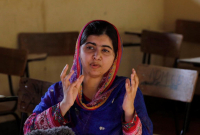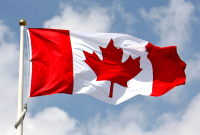Support strong Canadian climate journalism for 2025
Byrdie Funk marked Canada Day by taking a citizenship oath, but unlike the 150 people around her who also raised their right arm to do the same, she is hardly a newcomer.
Funk, who is a third-generation Canadian, became a first-generation Canadian Saturday after she regained her citizenship that was stripped from her just over a year ago by an arcane law.
"I have always been part of the Canadian family, I have always chosen Canada and for me today, it seems more like Canada has chosen me and I belong again," she said following the ceremony at Canada Place in Vancouver.
Funk, 37, was born in Mexico to Canadian parents and they moved back to Canada when she was just two months old. Since then, Canada has been home and she holds no other citizenship.
She was unaware of a law that requires people born overseas between 1977 and 1981 to parents who were also born abroad to apply to maintain their citizenship by the age of 28, and missed the deadline.
Losing her citizenship meant she couldn't leave Canada and couldn't vote. But Funk said she was lucky that her access to public health care wasn't stripped from her.
She joined a group "Lost Canadians" as she worked through the bureaucracy to regain her citizenship, and said she was surprised to discover how many other people were in the same boat.
Don Chapman, who champions the cause of so-called Lost Canadians, said, "The laws have become so convoluted."
He said archaic laws that blocked children of non-Canadian fathers from gaining citizenship or simply weren't properly registered at a hospital at birth continue to pose problems for people today.
"We need to not just close the gaps, we need a new citizenship act," he suggested as a solution.
Chapman was one of many friends and family members who celebrated Funk's newfound citizenship, which he called "a victory."
Although Funk has her citizenship back in hand, she said the ordeal is not quite over yet.
She said she's unsure how her contributions to the Canadian Pension Plan will be calculated and whether losing and regaining citizenship means her past contributions are void.
"I don't think anybody really has the answers, that's why we have to continue to advocate for change," she said.
The entire ordeal is one she said should never have happened in the first place.
"No one should ever get a letter in the mail saying, 'Sorry, you no longer belong here.' That was probably the hardest part," she said.
Funk intends continue to fight for others who lose citizenship over archaic policies and she said wants in the long term to see the laws re-written.





Comments